In the thick of the unprecedented economic disruption following the ongoing national lockdown prompted by the Covid-19 pandemic, India’s powerful 20 million strong politician-bureaucrat brotherhood steeped in socialist dogma, seems to have discerned an opportunity to deliver a hammer blow to private education – Dilip Thakore
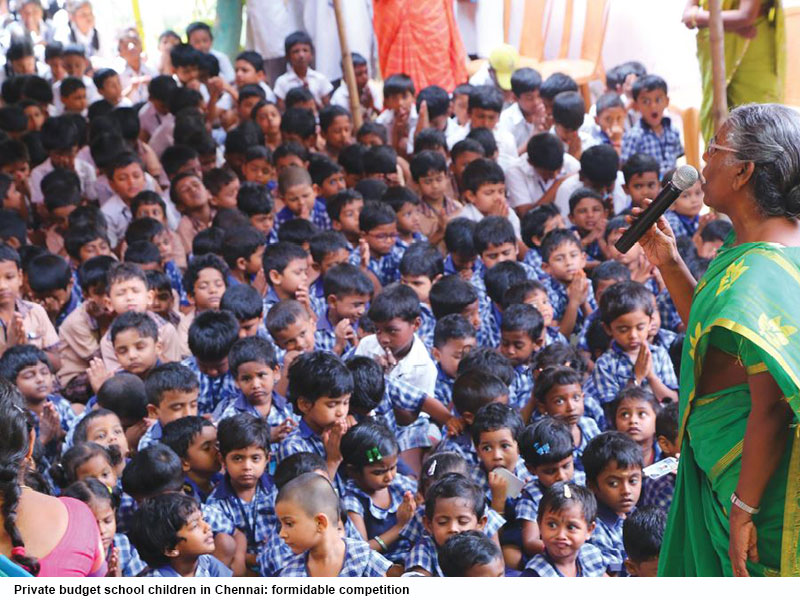
The country’s 375,000 private unaided schools, an estimated 400,000 budget private schools (BPS) and 300,000 private pre-primaries which provide superior education to over 50 percent of India’s 260 million inschool children, are suffering severe institutional stress and are being pushed to the edge of bankruptcy. Post-independence India’s establishment including the powerful 20 million strong neta-babu brotherhood steeped in socialist dogma has never acknowledged the massive nation-building contribution of private schools, colleges and universities. Now in the thick of the unprecedented economic disruption following the 68-day national lockdown prompted by the novel coronavirus (aka Covid-19) pandemic, it seems to have discerned an opportunity to deliver a hammer blow to private education. In particular to BPS which have emerged as formidable competitors of the country’s 1.20 million government schools.
State governments across the country have issued a spate of notifications and circulars ordering private school managements to waive or defer tuition fees for the March- June quarter. Coterminously, school managements are directed to continue to pay salaries and emoluments of their teachers and support staff. School promoters, principals and managements who fail to comply are being threatened with prosecution under several provisions of the Disaster Management Act, 2005. With parents of school-going children encouraged to breach their contract to pay their children’s school fees by confusing government notifications, and public sector banks reluctant to provide credit, a large and growing number of private schools — especially budget private schools — are laying off teachers and staff and contemplating closure.
“Although MSMEs (micro, small and medium enterprises) and agriculture have been given stimulus packages and interest payment moratoriums by government and nationalised banks, education is the only sector which has not been given any relief for the damage and loss it has suffered for having to shut down schools and all institutions for over three months following outbreak of the Covid-19 pandemic. On the contrary, parents are being advised by the state government not to pay tuition fees despite private schools switching to providing online education. Thus far, this, our member schools have continued to pay teachers and staff salaries. But with only 50-60 percent of parents paying their children’s fees, we are struggling to stay afloat. If schools are forced to remain shut for another three months, 60-70 percent of our member institutions will have to fire teachers and staff and close down permanently,” warns M. Srinivasan, president of the Management of Independent CBSE Schools Association (Karnataka) which has a membership of 130 schools with an aggregate enrolment of 2.5 lakh children.
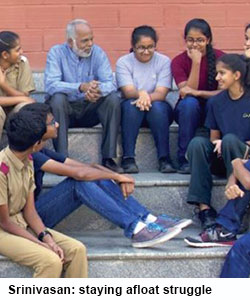 An alumnus of Mysore and Connecticut (USA) universities and founder-principal of the Gifted Education and Research (GEAR) Innovative International School, Bangalore (estb.1995), Srinivasan says that notifications and advisories issued by the Karnataka government to schools to defer fees even as they are arm-twisted to honour teachers’ employment contracts, are “proof of confusion and non-application of mind” within the state government. “The online learning revolution which has been forced upon the education system by the Covid crisis offers a great opportunity to India and particularly to Bangalore, which is brimming with software engineers, to develop excellent online learning programmes for India and the world. Government should focus on seizing this opportunity rather than damaging the city’s private schools ecosystem which has a national reputation,” adds Srinivasan. Currently, the low-profile but highly respected GEAR Innovative has 1,400 students and 180 teachers on its muster rolls.
An alumnus of Mysore and Connecticut (USA) universities and founder-principal of the Gifted Education and Research (GEAR) Innovative International School, Bangalore (estb.1995), Srinivasan says that notifications and advisories issued by the Karnataka government to schools to defer fees even as they are arm-twisted to honour teachers’ employment contracts, are “proof of confusion and non-application of mind” within the state government. “The online learning revolution which has been forced upon the education system by the Covid crisis offers a great opportunity to India and particularly to Bangalore, which is brimming with software engineers, to develop excellent online learning programmes for India and the world. Government should focus on seizing this opportunity rather than damaging the city’s private schools ecosystem which has a national reputation,” adds Srinivasan. Currently, the low-profile but highly respected GEAR Innovative has 1,400 students and 180 teachers on its muster rolls.
Although all private schools and education institutions have been damaged by the spate of confusing, contradictory and often unconstitutional government notifications, circulars and media releases — especially of state governments which have caused cash flow problems on a massive scale — low-cost budget private schools have been hardest hit. For one, BPS students tend to be from lower middle and working class households which have suffered most in the national lockdown of industry and business following Central government acknowledgment of the Covid-19 pandemic on March 25.
The shutdown of industrial plants and commercial establishments has hurt this segment of the population most in terms of lay-offs, wage cuts and limited work-from-home opportunities. Therefore, low-income households have been susceptible to messages to suspend payment of children’s school fees. With risk-averse banks reluctant to extend emergency credit even to well-established private schools, and the Central government resisting all exhortations to initiate a temporary ultra-universal basic income programme for 150 million poorest households repeatedly recommended by EducationWorld (see https://www.educationworld.in/ union-budget-2020-21-small-changefor- human-capital-development/) and several eminent economists, BPS promoters — typically former school teachers and small-time entrepreneurs with a streak of philanthropy — have been hung out to dry.
According to Dr. Kulbhushan Sharma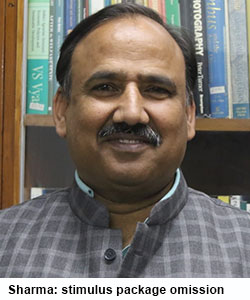 promoter-proprietor of the class I-VIII SBBM Middle School in Ambala Cantt (Haryana) and president of the Delhi-based National Independent Schools Alliance (NISA, estb.2011), which claims a membership of 60,000 private, mainly budget private schools, 50-60 percent of low-cost schools in Haryana have been landed with huge bad debts in fiscal 2019-20. “Typically, children’s fees for the January-March quarter are paid in March just before senior children write their board exams. But this year, all school-leaving exams have been cancelled, so the majority of affordable schools in Haryana have lost three months’ revenue while continuing to pay teachers and staff salaries. Simultaneously, state governments are advising private school managements to collect fees from only those who are capable of paying while new admission fees are on hold,” says Sharma.
promoter-proprietor of the class I-VIII SBBM Middle School in Ambala Cantt (Haryana) and president of the Delhi-based National Independent Schools Alliance (NISA, estb.2011), which claims a membership of 60,000 private, mainly budget private schools, 50-60 percent of low-cost schools in Haryana have been landed with huge bad debts in fiscal 2019-20. “Typically, children’s fees for the January-March quarter are paid in March just before senior children write their board exams. But this year, all school-leaving exams have been cancelled, so the majority of affordable schools in Haryana have lost three months’ revenue while continuing to pay teachers and staff salaries. Simultaneously, state governments are advising private school managements to collect fees from only those who are capable of paying while new admission fees are on hold,” says Sharma.
Nor have state governments made any attempt to reimburse BPS the huge amounts owing to them on account of having admitted poor children in their neighbourhoods under s.12 (1) (c) of the RTE Act. “The amount owing to BPS under this account in the small state of Haryana is Rs.50 crore and nationally it is lakhs of crores. If schools — many of them operating out of rented premises — remain under lockdown until September, 70-75 percent of BPS countrywide will be forced to close down and over 2 million teachers will lose their jobs. And if you add all stakeholders — suppliers, bus drivers, cleaners etc — over 20 million citizens will suffer unemployment and/or severe economic loss,” warns Sharma.
Sharma’s solution for this dreadful mess in private — especially in low-end affordable schools — education is for the Centre to deposit an aggregrate Rs.5,000 crore into the bank accounts of low-income households with children in the country’s 400,000 budget private schools to enable them to pay school fees on pain of expulsion for non-payment. “Curiously, only education institutions are under lockdown indefinitely, and no provision has been made for private schools which are educating almost 50 percent of the country’s in-school children, in the prime minister’s Rs.20 lakh crore economy stimulus package announced in May,” laments Sharma.
If the future of private schools overwhelmingly preferred by the middle class and aspirational households
at the base of the steeply iniquitous socio-economic pyramid is cloudy, the fate of the country’s estimated
300,000 private pre-primaries, aka preschools, is even more so. The Covid- 19 pandemic has spooked parents of youngest under-5 children, who according to dominant medical opinion are highly vulnerable to the coronavirus.
Consequently, a large number of standalone preschools promoted by child-friendly women edupreneurs
are likely to shut down, with wellfunded preschool chains such as EuroKids, Podar Jumbo Kids, Kangaroo
Kids, KidZee in a position to await better days. However, the great majority (50 percent) of the country’s 165 million under-five children receive a modicum of ECCE (early childhood care and education) in the 1.4 million anganwadis — essentially nutrition centres for lactating mothers and newborns — established by the Central government in 1976 under its Integrated Child Development Services (ICDS) programme. Although in its draft National Education Policy 2019, the Kasturirangan Committee gave pride of place and strongly recommended foundational ECCE, with the economy due to contract by 5 percent in fiscal 2020-21, the pathetically inadequate budget of the ICDS programme is certain to be slashed.
And it’s a measure of the proclivity of generalist bureaucrats to rush into experts’ territory, that in Karnataka, a state government circular of June 15 peremptorily banned online interaction between teachers and youngest children in all pre-primaries and primaries up to class V on the ground that “excessive screen time” is harmful for children. This unwarranted interference prompted a coalition of private preschools and schools to file a writ petition in the high court which passed strictures against the government and stayed the circular (see p.16).
The reckless knee-jerk reaction of the education bureaucracy to the pandemic and its seizure of the crisis to target private schools by prohibiting fees collection, discouraging online learning while simultaneously threatening dire consequences for failure to pay teacher and staff salaries, has outraged and demoralised private school managements confronted with the grim prospect of mass lay-offs and financial ruin.
In Maharashtra — even as the Bombay high court stayed (June 26) a blanket notification prohibiting all private schools in the state from increasing tuition fees in the forthcoming academic year 2020-21 — the Mumbai-based Unaided Schools Forum and two other private school associations have briefed renowned counsel Harish Salve to file a writ petition in the Bombay high court against the state government for abridging the fundamental rights of private school managements. In particular for disregarding the judgement of the Supreme Court in the landmark T.M.A. Pai Foundation Case (2002) in which a full-bench of the apex court ruled that private education institutions have full autonomy to administer themselves and levy reasonable fees commensurate with investment in infrastructure and co-curricular and extra-curricular education provided by them.
“Following the outbreak of the Covid-19 pandemic and shutdown of all education institutions in mid-March,
the Maharashtra government has been issuing a spate of GRs (government resolutions) directing private
school managements to cease and desist from collecting or raising tuition fees, while exhorting them to continue to pay teacher and staff salaries. Moreover in May, it had passed legislation to regulate the fees of private schools. 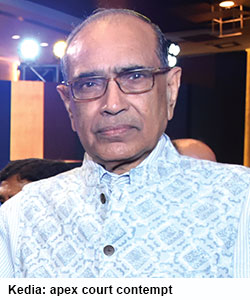 All this is in blatant disregard of the Supreme Court’s judgement in the Andheri Education Society Case (2003) which directed all states to ensure that their rules, regulations, notifications and GRs are in consonance with the court’s T.M.A. Pai judgement. However, successive governments of the state have totally ignored this directive of the Supreme Court and have destroyed the autonomy of private education institutions. Moreover, during the national Covid-19 lockdown era, they have issued several GRs without consulting any stakeholders in private schools which has created disharmony and prompted litigation which is draining school resources. In our writ petition due to be heard by the Bombay high court soon, we have inter alia alleged contempt of the Supreme Court’s judgement in the Andheri Education Society Case,” says S.C. Kedia, former in-house counsel to several major business houses for 40 years and currently honorary secretary of the Unaided Schools Forum.
All this is in blatant disregard of the Supreme Court’s judgement in the Andheri Education Society Case (2003) which directed all states to ensure that their rules, regulations, notifications and GRs are in consonance with the court’s T.M.A. Pai judgement. However, successive governments of the state have totally ignored this directive of the Supreme Court and have destroyed the autonomy of private education institutions. Moreover, during the national Covid-19 lockdown era, they have issued several GRs without consulting any stakeholders in private schools which has created disharmony and prompted litigation which is draining school resources. In our writ petition due to be heard by the Bombay high court soon, we have inter alia alleged contempt of the Supreme Court’s judgement in the Andheri Education Society Case,” says S.C. Kedia, former in-house counsel to several major business houses for 40 years and currently honorary secretary of the Unaided Schools Forum.
The deep animosity that the netababu brotherhood in the Delhi imperium and state capitals has towards
private schools which provide infinitely superior preschool to class XII education to the public at all price
points — private school education in India is cheaper than in any other country worldwide — is plainly manifest in the historic Right of Children to Free & Compulsory Education (RTE) Act, 2009.
Engineered by top limousine liberal Supreme Court counsel Kapil Sibal who was Union HRD minister
in the Congress-led UPA-II government, the Act (which required two constitutional amendments) repudiates
the State’s obligation to provide early childhood education to children in the 0-6 age group, and passes on
part of government obligation to provide primary education (age 6-14) to private schools. Under s. 12 (1) (c) private schools are obliged to reserve 25 percent capacity in elementary school (classes I-VIII) for poor household children in their neighbourhood and retain them free-of-charge until completion of class VIII. The cost of theireducation is to be reimbursed by state governments to the extent of the perchild expenditure incurred in government schools.
Surprisingly, the constitutional validity of s.12 (1) (c) which in effect mandates “backdoor partial nationalisation” of private schools and patently flies in the face of the apex court’s fulljudge bench in the T.M.A. Pai Case, was upheld by a convoluted 2-1 majority judgement of the Supreme Court in Society for Unaided Private Schools of Rajasthan vs. Union of India (2012). However, the court excluded boarding and minority schools from the ambit of s.12 (1) (c). But, exemption of minority schools from the purview of this section has been cleverly interpreted by skilled lawyers to enable the great majority of schools whose promoters and/or trustees are from myriad religious or linguistic minorities (a Hindu from Uttar Pradesh is a linguistic minority in Tamil Nadu) to claim exemption from s.12 (1) (c). According to Ambarish Rai, convenor of the Delhi-based RTE Forum, only 12 percent of the country’s
375,000 recognised private schools are compliant with this provision of the RTE Act.
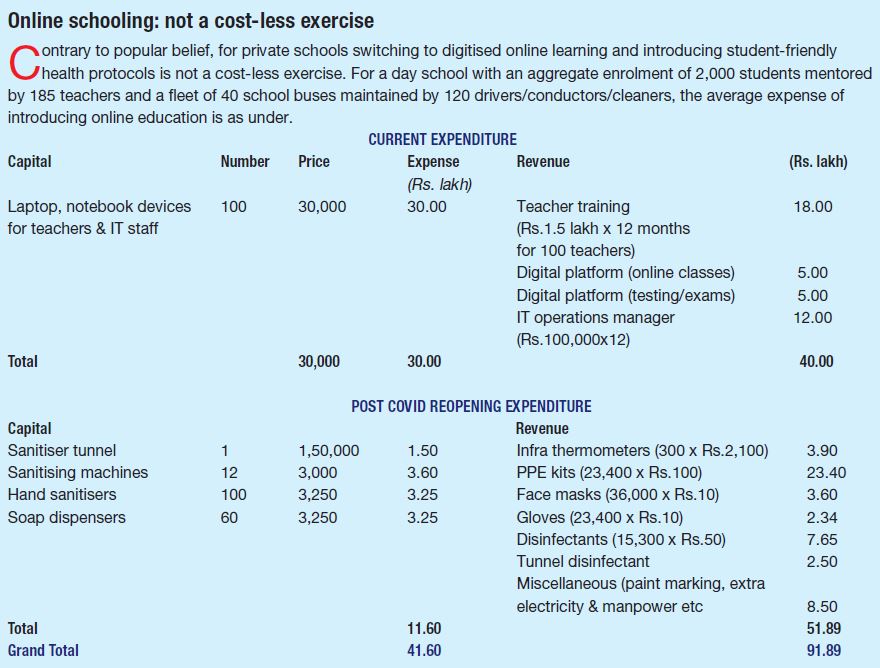
Source: Independent Schools Federation India, Ghaziabad Chapter
Yet hostile as is the animus of the neta-babu brotherhood towards recognised (licenced) private schools, it’s more antagonistic towards the country’s private budget schools (BPS), which are steadily attracting a rising flood of children from indifferently administered government schools defined by crumbling buildings, awful sanitation, chronic teacher absenteeism, aversion to teaching English and rock-bottom learning outcomes. Usually promoted by entrepreneurs with love of children and a philanthropic bent, BPS — many of them ‘unrecognised’ — claiming to offer English-medium primary-secondary education at the equivalent of
$5-15 (Rs.350-1,000) per month, are emptying out government schools.
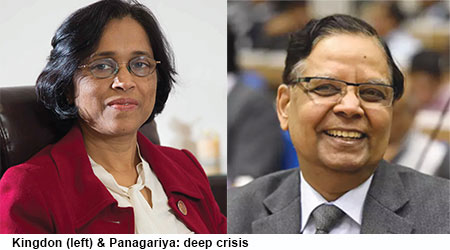
In an op-ed essay published by the Economic Times (June 7), Geeta Kingdon, professor at the Institute of Education, University College, London and Arvind Panagariya, professor of economics at Columbia University, USA (and founding chairman of NITI Aayog, Delhi), confirm this phenomenon. “India’s public elementary schools are in deep crisis. Begin with enrolments. Nationally, the number of these schools has remained almost unchanged between 2010-11 and 2017-18. But the number of students has declined from 126.2 million to 102.3 million— a reduction of 23.9 million students. The result: the average enrolment has fallen from 122 to just 99 pupils per school over the seven-year period,” write Kingdon and Panagariya.
Clearly, the neta-babu brotherhood had read this writing on the wall over a decade ago when it legislated the RTE Act, 2009. But instead of upgrading and reforming the country’s 1.20 million government schools by increasing their pathetically meagre allocation for education in the budgets of the Central and state governments (of which a huge 20 percent is absorbed by ‘establishment expenses’) they targeted BPS by inserting s.19 in the RTE Act which mandates impossible infrastructure norms for low-cost schools.
These norms detailed in a schedule of the Act prescribe low teacher-pupil ratio, demarcated principals’ rooms, kitchens, grain storage rooms, separate toilets for boys and girl children and a minimum one-acre playground per school. Iniquitously, s.18 exempts Central, state and municipal/local government schools from adherence to these norms.
Curiously, despite the entire middle and elite classes of Indian society who often move heaven and earth to get their children admitted into well-equipped, well-administered top-ranked private schools —they shun government schools like the coronavirus — they seldom protest the blatant discrimination and continuous official harassment that private school promoters and managements suffer.
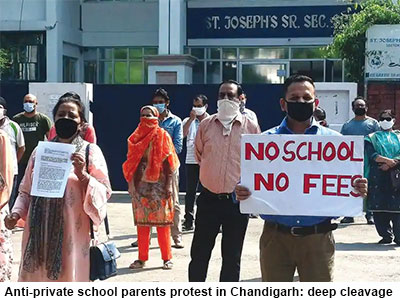 One of the major self-perpetuating achievements of the brotherhood has been to drive a deep cleavage between parents and promoters of private schools. In the socialist lexicon, edupreneurs — usually visionaries aware of the huge learning chasm between developed OECD countries and India who invest substantial capital to promote globally-benchmarked schools, colleges and universities — are mercenary capitalists hell-bent upon “commercialisation of education”, a pejorative popularised by the late Justice Krishna Iyer, self-confessed communist judge of the Supreme Court. Brainwashed by socialist rhetoric for over seven decades, post-independence India’s co-opted subsidies- addicted middle class and feeble intelligentsia welcomes and endorses government interference in private education, particularly in the matter of fees regulation.
One of the major self-perpetuating achievements of the brotherhood has been to drive a deep cleavage between parents and promoters of private schools. In the socialist lexicon, edupreneurs — usually visionaries aware of the huge learning chasm between developed OECD countries and India who invest substantial capital to promote globally-benchmarked schools, colleges and universities — are mercenary capitalists hell-bent upon “commercialisation of education”, a pejorative popularised by the late Justice Krishna Iyer, self-confessed communist judge of the Supreme Court. Brainwashed by socialist rhetoric for over seven decades, post-independence India’s co-opted subsidies- addicted middle class and feeble intelligentsia welcomes and endorses government interference in private education, particularly in the matter of fees regulation.
In recent years, despite the clear mandate of the Supreme Court’s full bench judgement in the landmark
T.M.A. Pai Case, almost all state governments have enacted legislation regulating school tuition fees and imposing ceilings. Inevitably, this legislation has been challenged in high courts across the country, and has tied up institutional managements in litigation which is draining their resources and driving them towards insolvency, which may well be the subliminal objective of the politician-bureaucrat nexus. Meanwhile, the abundant human resource of the world’s youngest population with a mean average age of 29 is being wasted on a massive scale, with dangerous implications for socioeconomic advancement and maintenance of law and order.
Surprisingly despite India’s low status in the contemporary world — the country is ranked a lowly #129
in the Human Development Index of UNDP and with a pathetic GDP of $3 trillion trails way behind the US ($21 trillion) and China ($14 trillion) — the vast majority, including the academy and the intelligentsia haven’t grasped the enormity of the damage that neta-babu socialism and continuous licence-permit-quota raj pervasive despite the partial liberalisation and deregulation initiative of 1991, have caused to the national development effort.
In this connection, it’s important to note that the subcontinent has a tradition of free enterprise and entrepreneurship stretching several millennia when privately manufactured goods from the subcontinent, including ocean-going ships, exotic meat-preserving spices, finest textiles, gold ornaments and precious stone jewellery dazzled newly-emerged nation-states of the western and eastern worlds. Despite this, post-independence India’s establishment including the educated middle class, has never respected, let alone admired private enterprise and great entrepreneurs who built formidable companies and business houses in the teeth of opposition from representatives of imperial Great Britain which ruled over the subcontinent for almost two centuries.
Pioneer industrialists and businessmen such as J.N. Tata, G.D. Birla, Walchand Hirachand, Ambalal Sarabhai, Lala Shri Ram, Jamnalal Bajaj, Sir Padampat Singhania among others who had bet their capital and scarce resources to build great manufacturing and trade enterprises in the first half of the 20th century, were poised to conquer Asian and Middle East markets with capital goods, manufactures and branded FMCGs (fast moving consumer goods) after independence.
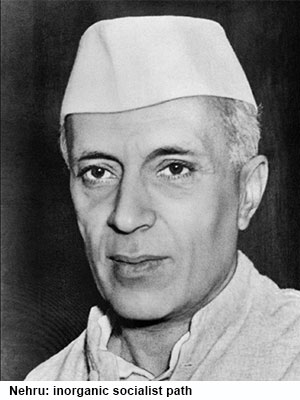 But after the assassination of Mahatma Gandhi and the untimely death of Sardar Patel — both of whom respected and admired indigenous business leaders who funded the freedom movement — free India’s first prime minister Jawaharlal Nehru, a natural sciences graduate of Cambridge University who had minimal grasp of economics, became enamoured with the centrally-planned Soviet template for national development and led the nation down the inorganic socialist path to national bankruptcy.
But after the assassination of Mahatma Gandhi and the untimely death of Sardar Patel — both of whom respected and admired indigenous business leaders who funded the freedom movement — free India’s first prime minister Jawaharlal Nehru, a natural sciences graduate of Cambridge University who had minimal grasp of economics, became enamoured with the centrally-planned Soviet template for national development and led the nation down the inorganic socialist path to national bankruptcy.
The price that free India’s citizens have paid for aimless wandering in the wilderness of Nehruvian socialism for over 70 years has been very heavy. For over three decades (1950-81), the country’s GDP growth averaged a mere 3.5 percent while the population increased (because of mass illiteracy and neglect of primary education) by 2.2 percent resulting in per capita income growth of a mere 1.3 percent per year. With national taxes and savings deposited in nationalised banks poured into giant non-performing public sector enterprises managed by over-promoted business illiterate clerks, the modest material aspirations of two generations of free Indians were wiped out as India descended into the bottom decile of the world’s poorest countries, with its population eking out a ship-to-mouth existence dependent upon American foodgrain
aid and Soviet military supplies.
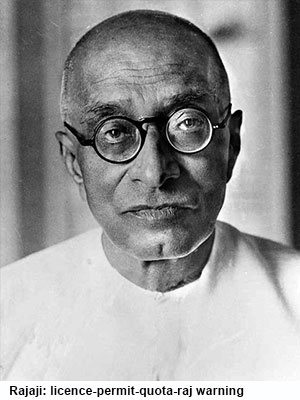 Learned political leaders such as C.R. Rajagopalachari (aka Rajaji) and Minoo Masani who cautioned against the dangers of India’s descent into “licence, permit-control raj” were ignored by the establishment including
Learned political leaders such as C.R. Rajagopalachari (aka Rajaji) and Minoo Masani who cautioned against the dangers of India’s descent into “licence, permit-control raj” were ignored by the establishment including
the country’s feeble-minded intelligentsia and new urban middle class co-opted into the establishment with generous unmerited subsidies provided at the expense of the country’s rural majority. Moreover, continuously deprived of remunerative prices for agriculture produce and unable to access acceptable quality primary education, the rural majority regressed into the stone-age.
Unsurprisingly, even as 12 national five-year plans with ambitious GDP growth targets — never achieved — were rolled out by a high-powered Planning Commission chaired by the prime minister, post-independence
India mutated into the world’s most corrupt democracy, a reputation it retains to this day. In the latest Corruption Perceptions Index, 2019 published annually by the Berlin-based Transparency International, India is ranked #80 among the 180 countries assessed. Coterminously because of the establishment’s hostility to private enterprise, contemporary India is ranked #63 among 190 countries evaluated by the International Finance Corporation (a subsidiary of the World Bank) for ease of doing business.
Yet if the neta-babu brotherhood harbours visceral hatred for private sector industry and business, it has even greater animus towards entrepreneurs in education. Although with typical Janus-faced hypocrisy, the country’s upper strata of politicians and bureaucrats routinely enroll their progeny in elite private schools — Nehru’s grandsons went to the top-ranked The Doon School, Dehradun and thence to British universities where they both failed to graduate — paradoxically they discouraged private education institutions at all levels. Although the lavishly endowed Birla Institute of Technology & Science (BITS), Pilani was conferred autonomous deemed university status in 1964 under the discretionary power of the UGC (University Grants Commission) because of the sheer political clout of the late G.D. Birla, down south despite the continuous effortsof extraordinary education missionary and entrepreneur Dr. T.M.A. Pai who established the Manipal Academy of Higher Education in 1953, it was grudgingly awarded university status in 1993, four years after Dr. Pai passed away.
Fortunately in India’s 29 states — K-12 education falls within their purview — private greenfield primary-
secondaries were permitted to be promoted relatively easily. Nevertheless large and small amounts of “speed
money” was — and continues to be — extorted from edupreneurs by the bureaucracy, which is conditioned to view all private initiatives in education with suspicion as “commercialisation of education”. Given this officially and judicially sanctioned prejudice against private initiatives in education, it’s hardly surprising that the proposal to establish India’s first post-liberalisation international school mooted in 1979 matured in 1997 when the Mahindra United World College, Pune, affiliated with the Geneva-based International Baccalaureate school-leaving examination board was licensed to admit its first batch of students from 12 countries.
Since then, especially after the historic liberalisation of the dirigiste centrally planned economy was substantially deregulated in 1991 with the abolition of industrial licensing and junking of monopolies legislation, alarge number of private schools, including international schools affiliated with progressive offshore examination boards such as the International Baccalaureate and Cambridge International have sprung up across the country. Currently, TAISI (The Association of International Schools of India) has an institutional membership of 150 primary-secondaries with an aggregate enrolment of 120,000 boys and girls. Simultaneously, a sizeable number of new-genre indigenously promoted, internationally benchmarked schools — Dhirubhai Ambani International School, Ecole Mondiale in Mumbai, Heritage Xperiential, G.D. Goenka and Pathways in Delhi NCR; Indus International, Jain International and Inventure Academy in Bangalore — all established in the new millennium — are giving vintage Raj-era day and boarding schools formidable competition.
Although it is somewhat self-serving to say so, a major factor which has prompted upgradation and contemporisation of K-12 education in the new millennium is introduction of the annual EducationWorld India School Rankings (EWISR) in 2007. These ranking surveys which are followed by celebratory award nights in which topranked schools in every category are felicitated and awarded, have raised quality awareness and an unprecedented teaching-learning revolution in Indian education. Unsurprisingly, the EW rankings, which reflect onthe- ground reality that private schools and colleges provide far superior education than the great majority of government institutions, have provoked hostility and contempt in the Union HRD ministry in New Delhi and the states. Invitations to our events and interview requests are routinely denied by the ministry and officials of its subsidiaries CBSE, NCERT, UGC, AICTE etc.
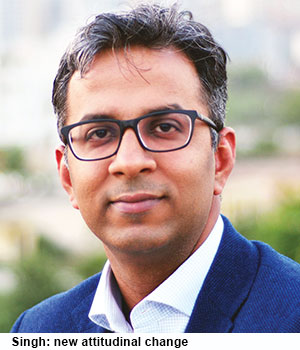 Nevertheless, Arunabh Singh, director-principal of the CBSE-affiliated Nehru World School, Ghaziabad (estb.1978), ranked the city’s #6 co-ed day school in the latest EW India School Rankings 2019-20, and a committee member of FICCI-Arise (Alliance for Reimagining Indian School Education), a lobby group of private school promoters affiliated
Nevertheless, Arunabh Singh, director-principal of the CBSE-affiliated Nehru World School, Ghaziabad (estb.1978), ranked the city’s #6 co-ed day school in the latest EW India School Rankings 2019-20, and a committee member of FICCI-Arise (Alliance for Reimagining Indian School Education), a lobby group of private school promoters affiliated
with the influential Federation of Indian Chambers of Commerce & Industry (FICCI), believes that a sea
change in the attitude of government and the Union HRD ministry towards private education is imminent.
“There is a discernible change of government attitude and willingness to work together with private schools,
foundations and NGOs, particularly in the new era after the Covid-19 lockdown of all education institutions.
With the promotion of Anita Karwal, hitherto chairman of CBSE which has a large number of affiliated private schools, to the office of secretary of the Union HRD ministry, there is greater willingness in the ministry to interact and cooperate with all stakeholders in education — private school organisations, reputable trusts and foundations, and NGOs. I believe that a new ecosystem based on trust, cooperation and involvement of all stakeholders including the teachers’ community is being built to raise learning outcomes in private and government schools,” says Singh, an alumnus of Delhi University and King’s College, London.
There is a familiar deja vu ring to such hopes of greater Central and state government attention to public
education and deregulation of private schools and higher education. Though politicians routinely highlight the importance of quality education and the country’s demographic edge, these lofty sentiments have not yet been matched with greater investment in public education.
Despite the Kothari Commission (1966), the National Education Policy (1992), T.S.R. Subramanian Committee (2016) and the Kasturirangan Committee (2019) — the latter’s liberal draft recommendations have been under consideration of the HRD ministry for over 12 months — government (Centre plus states) investment has been stuck in the 3-3.50 percent of GDP groove for seven decades. Moreover, reports from Shastri Bhavan, Delhi indicate a furious debate about unbundling the functions of regulation, provision, funding and standards setting — currently vested in the HRD and state education ministries — and vesting them in separate autonomous institutions. In the unlikely event of this recommendation of the Kasturirangan Committee being accepted, it will considerably reduce the life-and death power of the educracy and the neta-babu brotherhood over the country’s schools, colleges and universities.
In the circumstances, the onus is on the public, including the academy and intelligentsia, to exert pressure on
the Centre and states to increase their public education expenditure and take urgent steps to improve learning outcomes in state-funded schools and higher education institutions. Simultaneously, a public outcry against official harassment of private institutions in education is long overdue.
Simultaneously the officially endorsed image of private education providers — substantially individuals
driven by the spirit of enlightened selfinterest and/or philanthropy — needs to be given an early burial. In these perilous times, the national interest demands that the Central and state governments focus their attention on sharply improving infrastructure, teaching-learning standards and learning outcomes in basic education in the country’s 1.20 million government schools while lightly regulating private primary-secondaries providing acceptable quality education to almost 50 percent of in-school children.
The rationale of according highest priority to universalising school education is explained by Nobel laureate
economist Dr. Amartya Sen in his best-seller The Argumentative Indian – Writings on Indian History, Culture & Identity (2005). “The under-development of Indian school systems, especially in the backward regions of the country has been… extraordinary. This is both deeply inefficient and amazingly unjust… If we have not been able to seize economic opportunities for the manufacture of simple products in a way that has happened in Japan, Korea, China and other countries of east Asia, not to mention the West, India’s remarkable neglect of basic education has a decisive role in this handicap,” writes Sen.
Time to heed the words of prophets, visionaries and savants.
Converting Covid-19 threat into reform opportunity
The number of suggestions and recommendations of ways and means to manage the Covid-19 pandemic and
simultaneously reform K-12 education during the prolonged lockdown of all schools and education institutions sent to EducationWorld, has become a flood. Given below are some suggestions by experienced school promoters and education professionals.
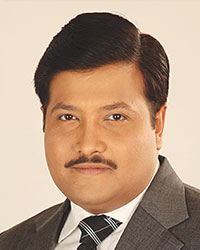 “The Central government should award ‘infrastructure’ category status to all education projects and direct banks to grant loans of 30-40 years tenure — against the present tenure of ten years — to reduce loan repayment burden of school managements. Interest on these loans should be capped at 6-7 percent. The BJP government has also introduced 18 percent GST on school building rents which should be immediately revoked. Moreover, the government should waive property tax, bus permit charges, passenger tax, insurance payable by schools for one year. All these measures will enable private school managements to pass on these financial reliefs to parents and reduce school fees.” — Dr. Vinay Jain, managing trustee, Witty Group of Institutions, Mumbai
“The Central government should award ‘infrastructure’ category status to all education projects and direct banks to grant loans of 30-40 years tenure — against the present tenure of ten years — to reduce loan repayment burden of school managements. Interest on these loans should be capped at 6-7 percent. The BJP government has also introduced 18 percent GST on school building rents which should be immediately revoked. Moreover, the government should waive property tax, bus permit charges, passenger tax, insurance payable by schools for one year. All these measures will enable private school managements to pass on these financial reliefs to parents and reduce school fees.” — Dr. Vinay Jain, managing trustee, Witty Group of Institutions, Mumbai
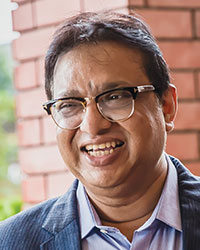 “When they reopen, all schools should be permitted to introduce a new teaching- learning system incorporating online and offline learning in the ratio 30:70. A new hybrid learning curriculum should be developed to allow schools to ensure physical distancing. Moreover, online classes should be small with emphasis on student-centric learning. All stakeholders need to work in cohesion to develop a new system of education delivery to ensure successful co-existence of private and public educational institutions.” — Dr. Bijaya K. Sahoo, founder-chairman, SAI International Group, Bhubaneswar
“When they reopen, all schools should be permitted to introduce a new teaching- learning system incorporating online and offline learning in the ratio 30:70. A new hybrid learning curriculum should be developed to allow schools to ensure physical distancing. Moreover, online classes should be small with emphasis on student-centric learning. All stakeholders need to work in cohesion to develop a new system of education delivery to ensure successful co-existence of private and public educational institutions.” — Dr. Bijaya K. Sahoo, founder-chairman, SAI International Group, Bhubaneswar
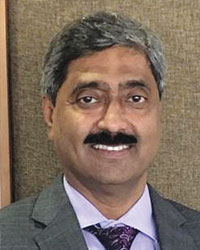 “I believe the government needs to hold extensive deliberations and discussions with school managements, principals and parents before issuing circulars. One-sided government decisions and policies without consultation with key stakeholders lead to disagreement and court cases. Government should provide broad guidelines and parameters, with every school given the flexibility to devise its own solutions within the guidelines framework. Now the biggest challenge before government is to prescribe safety protocols for schools after reopening. It should do this with due care and consideration bearing the welfare of all stakeholders in mind.” — Rohan Bhat, chairman, Children’s Academy Group of
“I believe the government needs to hold extensive deliberations and discussions with school managements, principals and parents before issuing circulars. One-sided government decisions and policies without consultation with key stakeholders lead to disagreement and court cases. Government should provide broad guidelines and parameters, with every school given the flexibility to devise its own solutions within the guidelines framework. Now the biggest challenge before government is to prescribe safety protocols for schools after reopening. It should do this with due care and consideration bearing the welfare of all stakeholders in mind.” — Rohan Bhat, chairman, Children’s Academy Group of 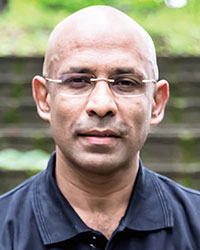 Institutions, Mumbai
Institutions, Mumbai
“Shutting down schools and disrupting children’s education for long stretches of time will not only harm children’s learning but also adversely affect their mental well-being. Instead of blanket denial of education, government should devise broad guidelines for online classes and strategise ways and means to ensure equity in online access. Moreover, while framing these guidelines it should consult with education experts. Arbitrary and unilateral decision-making by government is doing more harm than good. We should bear in mind that in many parts of the world, K-12 education is being effectively continued online.” — K.E. Harish, CEO, 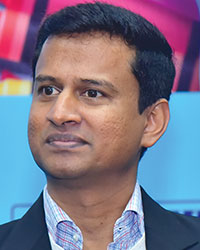 Sadhbhavana World School, Kozhikode
Sadhbhavana World School, Kozhikode
“According to latest neuroscience research, long gaps in education can lead to irreparable learning loss in children, especially youngest children. Therefore, the top priority of government should be to maintain continuity through online learning. Moreover fees is the only source of revenue for schools and critical to ensuring timely salary payments to teachers and staff. Government needs to acknowledge that private schools are deeply engaged in nation building.” — Praveen Raju, founder, Suchitra Academy, Hyderabad


























